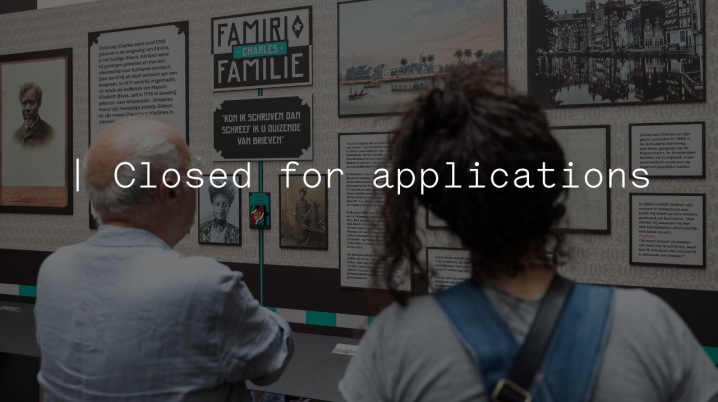
Matching Fund Open Call: Slavery Memorial Year
This open call is closed. You can no longer submit your application.
DutchCulture | International Heritage Cooperation launches an additional open call for the Matching Fund to support projects that highlight the history of slavery and indentured labour in former Dutch colonies and trading posts, and bring these stories to the attention of a broad audience. Grants up to € 25.000 per project are available.
During the Slavery Memorial Year (2023-2024), the Kingdom of the Netherlands reflected on its painful history of slavery in former Dutch colonies and the lasting impact it has today. Although the Slavery Memorial Year officially ended on July 1st, the recognition and consequences of this history remain important in the international heritage field. Therefore this additional funding round is launched.
Who can apply?
Heritage and creative professionals, organisations, and institutes based in the Kingdom of the Netherlands (including Aruba, Bonaire, Curaçao, Saba, Sint Eustatius and Sint Maarten) are welcome to apply in partnership with their counterpart(s) from the countries mentioned in the International Cultural Policy.
These countries are Australia, Brazil, India, Indonesia, Japan, South Africa, Sri Lanka, Suriname, the United States, Ukraine, Belgium, China, Egypt, France, Germany, Hungary, Italy, Morocco, Poland, South Korea, Spain, Turkey, United Kingdom, and Ghana.
What kind of projects are eligible?
The Matching Fund supports projects from all cultural expressions, such as exhibitions, international events, theatre performances, podcasts, etc. Book publications and public programming connected to documentary films are also eligible, but restricted funding is available for these projects. Please check the criteria information link below for further information.
Since visibility and cooperation are the focus of this scheme, projects should emphasize reciprocal representation, multiperspectivity and historical awareness. Applicants are encouraged to address the ongoing impact of slavery and indentured labour today.
How to apply?
A complete application consists of a filled-out application form, a budget proposal two recommendation letters and letters of intent from the project leaders. Please read further practical information and details on the application requirements in the Application Criteria document below.
You can no longer apply for this open call.
More information & application requirements:
Frequently asked question's (FAQ's)
- 1. My project addresses the topic of colonial history more generally. Can I still apply for this open call?
Projects addressing colonial history are eligible for Matching Fund support. However, this open call is specifically set up to honour projects relating to the history of slavery and/or indentured labour in former Dutch colonies, in the context of the Slavery Memorial Year. It is therefore important to highlight the connection to this topic in the project proposal.
- 2. What is meant by ‘reciprocal collaboration’?
‘Reciprocal’ refers to a partnership that is based on a bilateral commitment, in which partners from both countries jointly decide on the form and content of the project and share similar responsibilities.
- 3. Can I collaborate with a partner from Aruba, Bonaire, Curaçao, Saba, Sint Eustatius or Sint Maarten?
No, since Aruba, Bonaire, Curaçao, Saba, Sint Eustatius and Sint Maarten are part of the Kingdom of the Netherlands this is not considered an international collaboration. Therefore, you will not meet the criteria to apply for the Matching Fund Open Call.
- 4. What countries can I designate as partner countries?
Heritage and creative professionals, organisations, and institutes based in the Kingdom of the Netherlands (including Aruba, Bonaire, Curaçao, Saba, Sint Eustatius and Sint Maarten) can collaborate with the partner countries mentioned in the current International Cultural Policy.
These countries are Australia, Brazil, India, Indonesia, Japan, South Africa, Sri Lanka, Suriname, the United States, Ukraine, Belgium, China, Egypt, France, Germany, Hungary, Italy, Morocco, Poland, South Korea, Spain, Turkey, United Kingdom, and Ghana.
- 5. Can I apply for the Matching Fund Open Call with multiple project proposals?
No, you can only apply for the Matching Fund once, even when working on several projects. We encourage you to choose the project that most closely aligns with the topic of the call.
- 6. I have received funding through the Matching Fund before. Can I apply for this open call again?
No, a project that has previously received funding through the Matching Fund cannot apply for additional support.
- 7. What supporting documents do I need to prepare for the application?
The supporting documents you need to attach to the application are the following:
• Budget proposal (Excel or PDF)
• Letters of intent from the project leaders (Word or PDF)
• Two letters of recommendation (Word or PDF)
• CVs of the project leaders (Word or PDF)- 8. What are letters of recommendation?
Letters of recommendation should comment on the importance of the project and/or the capabilities of the project leaders. These letters must be written by relevant professionals in the heritage/cultural field.
- 9. Can I receive feedback from DutchCulture on the documents I want to include in the application?
No, it is not possible to receive feedback from DutchCulture on your documents. However, you can schedule an advisory consultation by contacting us via internationalheritage@dutchculture.nl
Contact
Please contact us via internationalheritage@dutchculture.nl if you have any further questions about your project.




